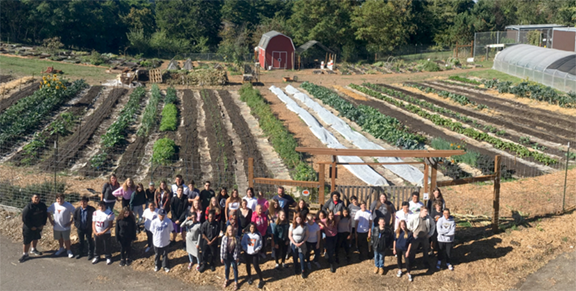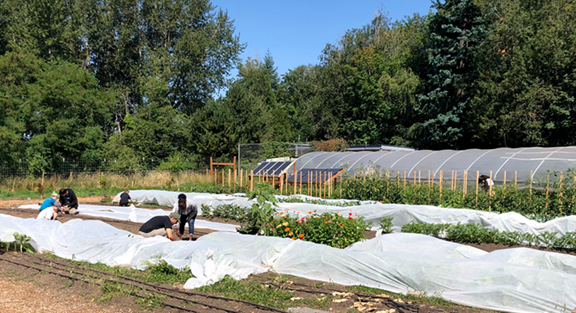Terra Nova students learn science through farming

By Bruce Bartlett
As we sequestered at the start of the COVID pandemic in the spring of 2020, students had to abandon the farmland at the Terra Nova High School, the Beaverton School District’s (BSD) teaching farm school located in Bonny Slope at Thompson and McDaniel (in the former Bonny Slope School). Students, teachers, and local farmer/county commissioner Greg Malinowski had worked over the years to create three acres of fertile soil from hard playground.

As a result of the pause, the fields turned into a thorny jungle as Canadian Thistles grew higher and higher. Unable to just witness this kind of garden deterioration, I met the principal, Michael Crandall, and teacher/farmer Joel Whitmore, who were struggling to stay ahead of the weeds, and offered to help along with a handful of other volunteers.
The tall thickets of thistles and weeds were repeatedly mowed to the ground. Finally it was time to turn to cultivation. John Russell of the Bonny Slope Blueberry farm loaned us his mighty little tractor and I started rototilling the soil. The 50-pound coffee sacks used for mulching the pathways had rotted away but the tough (damned) nylon strings they were sewn together with did not. I must have stopped 50 times while tilling to cut the strings off the tiller tines but by the spring of 2022 the ground was prepared for the return of the students.

Terra Nova has two agricultural areas: garden beds for each student to grow the plants they study in class, and separate beds for vegetable production. Originally intended to grow produce to be sold at the Cedar Mill Farmers Market, their production beds now send bins of vegetables to local food pantries. Crops are rotated and the beds replanted several times during the growing season. In the summer, interns are hired to manage the farm chores alongside the instructors (and enthusiastic volunteers.)

Students may enroll in either the Field Biology/Sustainable Foods or Applied Chemistry/Sustainable Food tracks offered at Terra Nova. These project-based courses are taught at the school which provides a working farm, woodshop, and industrial-scale kitchen. There is no cost to join the program, and boots, gloves, and tools are provided. A yearly plant sale subsidizes some of the program’s expenses.
Terra Nova is open to any student that attends a BSD comprehensive high school (Aloha, Beaverton, Mountainside, Southridge, Sunset, or Westview). Buses transport the students to the school. If more students apply for the program than space is available, a randomized lottery system is used to select the students.
Field Biology is a rigorous course that covers the foundational principles of modern life through the lens of sustainable agriculture. Students work outside on the farm and inside the classroom learning field biology techniques. Course content includes all the BSD Biology standards: biochemistry, cellular processes, genetics, evolution, sustainability, and ecology.
Applied Chemistry is available for Physics students in the STEM (Science, Technology, Engineering and Math) program and includes all the BSD Chemistry standards: intermolecular forces, structure and properties of water, kinetic molecular theory, equilibrium, and climate change.
I spoke with an enthusiastic student name Eli who explained the way he is participating in the program. As a sophomore he enrolled in the chemistry course. He intends to enroll in the field biology course as a junior and then, as a senior, will create his own custom curriculum focusing on subjects of particular interest to him These individual study plans are approved by the instructors. At the beginning of each school year, the classes are divided into teams of five. Together they plan recipes for the meals they would like to cook in the amazing modern school kitchen, then find seeds and plant the vegetables in their own garden beds (3′ x 6′), tending them until harvest. In the process, each student earns an Oregon Food Handler’s card to ensure safe food preparation, which is simplified by the school’s vegetarian-only policy as meat requires much more careful preparation. As with so many students (including myself in high school band and theater—1969 grad from Forest Grove), the experiences beyond the classroom are those which often enrich their lives the most. The acts of planting, tending, harvesting, and eating together creates bonds of long-lasting friendship.
Started in 2010, Terra Nova grew out of the spirit of two programs previously offered by the Northwest Regional Education Service District, the Cascade Education Corps, and the Outdoor Leadership Program. These outdoor environmental education programs gave students valuable training and hands-on experience in leadership, teaching, and environmental issues. This real-world learning provides an opportunity to develop personal, team building, and problem-solving skills for students who thrive better outside of a big-box school.
BSD had to shut down the program in 2012 due to budget cuts, but it was restarted in 2014 and has been active ever since. Today’s students are self-motivated and prepared to work outside for portions of the course. They plant, grow, and harvest fruits and vegetables in their own garden beds to learn hands-on how chemistry and biology concepts are an integral part of all the food we eat each day. Critical thinking, research, communication, and analysis are emphasized, and the technological, historical, political, and environmental aspects of chemistry and sustainability are addressed.
A collection of fun video testimonials is provided on the Terra Nova’s Facebook page.
It is hard for me to comprehend the motivation but in April 2022, Terra Nova was burglarized. Their brand-new walk-behind BCS cultivator, farm implements and hand tools, plus the solar panels and storage batteries from their greenhouse were stolen over a weekend. They were lucky that insurance reimbursements and a slight budget surplus paid for replacing the equipment, but several time-critical cultivation chores were delayed so I did another round of tilling which kept the fields and student beds ready for spring planting. This spring, 120 students attended Terra Nova, and the satisfaction I gained from volunteering to help achieve this is priceless to me.
Readers are encouraged to make donations to the school. Needed items are listed on their website and can be dropped off at the farm during school hours.





